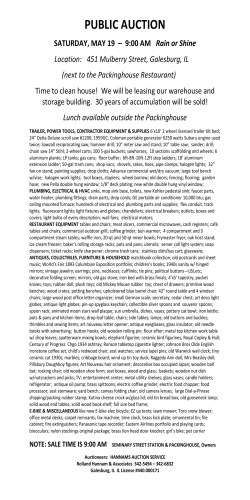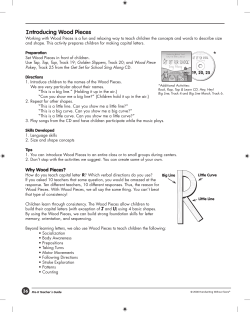
ThE fuTurE lOOks gOOd fOr mOBilE wOOd ChippEr
CASE STUDY The future looks good for mobile wood chipper Ernslaw Bio-Energy is well-placed to take advantage of an expected increase in the use of wood-chip boilers, thanks to the Central Otago company’s decision to buy a mobile wood chipper. Ernslaw Bio-Energy bought the $250,000 German-made Heizohack HM10-500 KT chipper and the John Deere 7530 tractor which powers it, in 2008 with the help of a grant from the Energy Efficiency and Conservation Authority (EECA). The mobile wood chipper is one of the first of its kind in New Zealand. During a test run, the chipper produced 13 tonnes of wood-chips in an hour using only 30 litres of diesel — enough chips to heat an average-sized school with a wood-chip boiler for 10 days. According to Ernslaw Bio-Energy’s Project Manager Murray Cowan, “wood-chip boilers are very clean-burning, very easy to use, and they’re cost effective. They are now quite common in Europe, mostly to heat water for central heating. We see lots of opportunities for similar systems here, especially in schools and places such as hospitals, motels and glasshouses.” www.eecabusiness.govt.nz Wood is a good source of energy Wood is tipped to become the eco-friendly fuel of the future. Unlike fossil fuels, such as coal, diesel and gas, wood is both renewable and nearly carbon-neutral; the carbon dioxide wood produces when it is burned is absorbed by the next crop of trees. Using wood as a fuel makes particular sense in New Zealand, because wood is so widely available. New Zealand has the highest percentage of forestry cover in the Southern Hemisphere - 1.8 million hectares of forest estate, which covers 6.7% of the total land area. Wood also provides an environmentallyfriendly alternative to fossil fuels in areas such as Otago, Southland and Christchurch, where local clean air legislation will eventually restrict the use of coal-fired boilers. Wood is already widely used as an energy source in the forestry and wood processing industries, which have plenty of wood residues available onsite. EECA is keen to support the development of this market – supplying grants to those selling or burning wood fuel in their business or organisation. The value of wood-chips Wood-chips are made from wood offcuts, firewood logs or forest residue. They are easier to produce than wood pellets, and they cost less. This makes them particularly suitable for larger institutions that require a lot of space heating, such as schools and hospitals. However, while commercial-sized woodchip boilers are popular in Europe they are still relatively uncommon in New Zealand. One reason is that while it is possible to convert existing coal-fired boilers to run on wood pellets, in most cases woodchips can only be used in a purpose-built boiler. Buying a new wood-chip boiler also requires a bigger initial capital investment than converting an existing coal boiler to wood pellets. Another reason that wood-chip boilers are not widely used is that until recently it has been difficult to find reliable sources of quality wood-chips. “It’s a chicken and egg situation,” says Mr Cowan. “No-one is going to put in a wood-chip boiler if they can’t get the chips, but many companies are reluctant to invest in the chippers without clients to sell the chips to.” Mr Cowan says that Ernslaw Bio-Energy was initially reluctant to invest in a chipper, too. However, the company, which is a subsidiary of forestry company Ernslaw One Ltd, was keen to find a way of adding value to low-grade logs, rather than simply selling them for firewood. The company could also see that the demand for wood-chips would increase as more people recognised the advantages of wood-chip boilers. Mr Cowan says investing in a chipper made particular sense for Ernslaw Bio-Energy because of its location in Naseby, Central Otago. The dry climate means that logs can be air-dried before they are chipped. This makes it easy to produce chips with a lowmoisture content – which many wood-chip boilers need . About the Heizohack HM10-500 KT wood chipper The Heizohack HM10-500 KT wood chipper is a mobile wood chipper which is powered by the driveshaft of a John Deere 7530 tractor. The chipper has an integrated crane powered by the hydraulics of the tractor. The chipper and tractor are both road legal, so the tractor is used to tow the chipper from site to site. The Heizohack HM10-500 KT chipper can chip wet and dry logs up to 50 cm in diameter. However, Ernslaw Bio-Energy has found that the chipper tends to slow down when it chips logs with a diameter EECA enables organisations to increase their domestic and international competitiveness by adopting energy efficiency and renewable energy practices. We work with businesses to identify the opportunities for energy management that are available to them and help them develop energy management action plans to make the most of these opportunities. Good energy management has many benefits for businesses, including lower costs, increased productivity, of 25 cm or more. This is directly related to the size of the tractor used; a larger, more powerful tractor would increase the throughput of the chipper when dealing with larger logs. The chipper can also chip branches and the tops of trees. These must be free of rocks and dirt in order to produce goodquality fuel. Mr Cowan points out that keeping branches and tops clean means that logging crews may have to change their attitude towards them. “They need to start seeing branches and tops as things of value which need to be treated with care, rather than just waste to be pushed out of the way.” reduced greenhouse gas emissions and a positive effect on the brand. We have a particular interest in: • encouraging new or under-used technology that can make processes more efficient • projects that reduce greenhouse gas emissions, and • developing the wood fuel industry. For more information, contact us directly – see details below. Energy Efficiency and Conservation Authority contact details: EECA HEAD OFFICE: PO Box 388, Wellington, (04) 470 2200 EECA CHRISTCHURCH: PO Box 8562, Christchurch, (03) 353 9280 www.eecabusiness.govt.nz EEC0902_03/09 EECA AUCKLAND: PO Box 37444, Parnell, Auckland, (09) 377 5328
© Copyright 2026




















